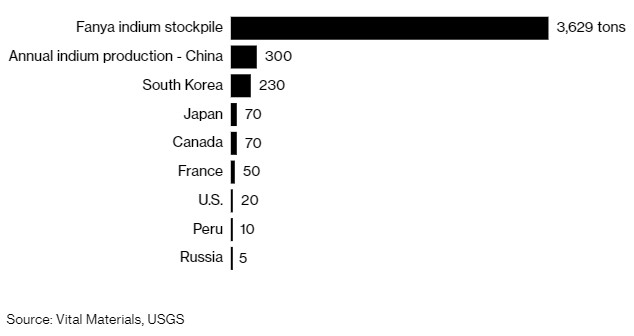In The News

IN THE NEWS - Obscure Chinese Company Buys Vast Stock of Metals U.S. Labels ‘Critical’ to Industry
By Mark Burton and Jack Farchy, Bloomberg News
January 23, 2020, 7:46 PM GMT+8
Vital Materials acquires stockpile from defunct Fanya bourse
Purchases end uncertainty over fate of impounded metals
A little-known Chinese company has bought up a vast
stockpile of metals that are indispensable to the electronics industry,
including enough indium to satisfy six years of global demand of the material
found in flat-screen TVs and cellphones the world over.
Vital Materials Co. Limited’s $600 million swoop to
acquire the stockpile in a government auction is the culmination of a wild tale
of speculation and market manipulation in a small, but strategically important
corner of the metals markets.
Almost everything bought by Vital Materials is on the list
of minerals classified as “critical†by the U.S. two years ago as part of
President Donald Trump’s vow to reduce America’s foreign dependence. While many
of the metals are found in small quantities at mines around the world, China
has come to dominate in transforming them into high-purity products needed in
advanced manufacturing.
Outside of the metals markets, indium’s importance largely
escaped attention until the early 2010s, when thousands of investors in China
caught on to its significance and bought huge volumes on a trading platform,
called the Fanya Metal Exchange.
Infinite Indium
The Fanya stockpile is more than ten times larger than
annual output in top producer China

The back story of Fanya dates back to 2011, when the
exchange was launched with a promise of fixed high-yield income. The investment
was backed by inventories of strategic metals like indium, gallium and
germanium, which help power high-tech products from night-vision goggles to
computer chips.
But when the bourse collapsed amid suspicions of fraud in
2015, investors were left facing multibillion-dollar losses, according to
media reports.
Authorities impounded the colossal volumes of indium and other so-called minor
metals that had accumulated on the bourse.
The result was a years-long pall over the small industry as
traders questioned whether the stockpiles would eventually flood back into the
market.
Now, with indium prices languishing at the lowest in more
than a decade, China’s Vital Materials has paid more than $600 million to
acquire the stockpile at auction. The deal removes the surplus of inventory
from the market and helps draw a line under one of the biggest scandals to hit
China’s metals industry.
“The fear that the Fanya stocks might flood into the market
and destroy the already very delicate balance of supply and demand has been
overhanging onto the market,†Vicky Zeng, Vital’s global vice president for
sourcing, said in a statement. “With all these metals being moved to Vital,
people can be relieved as all the metals will be consumed and leveraged
internally.â€
The move cements Vital’s position as a powerful force in
niche markets as China and the U.S. focus on securing raw materials that are
critical to their technological and military primacy.
While it’s little known outside China, the company employs
more than 4,000 people across eight sites in the country and several overseas
plants. It’s capable of using up the entire stockpile internally over time and
is likely to complete further acquisitions soon that will further underpin its
growth, Zeng said by phone.
